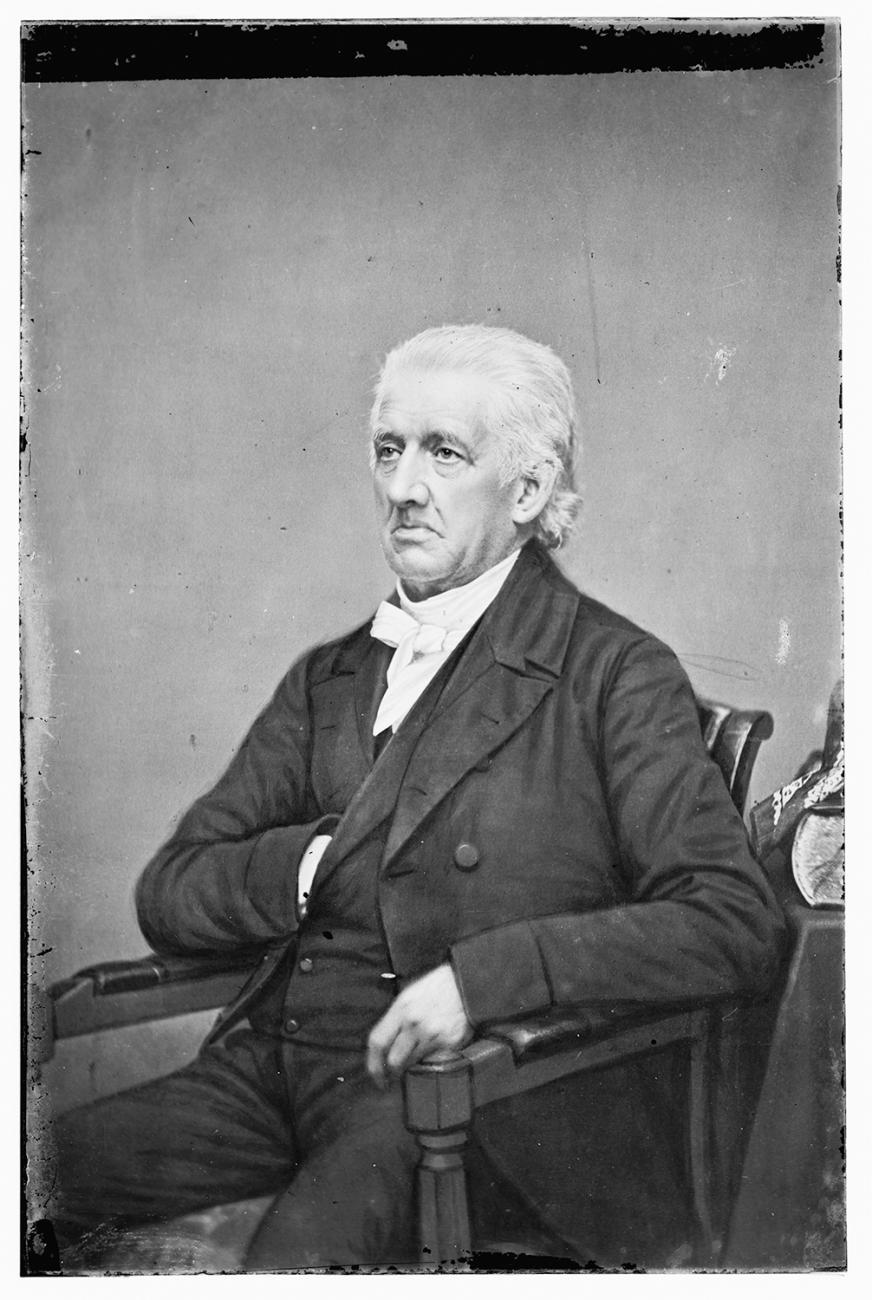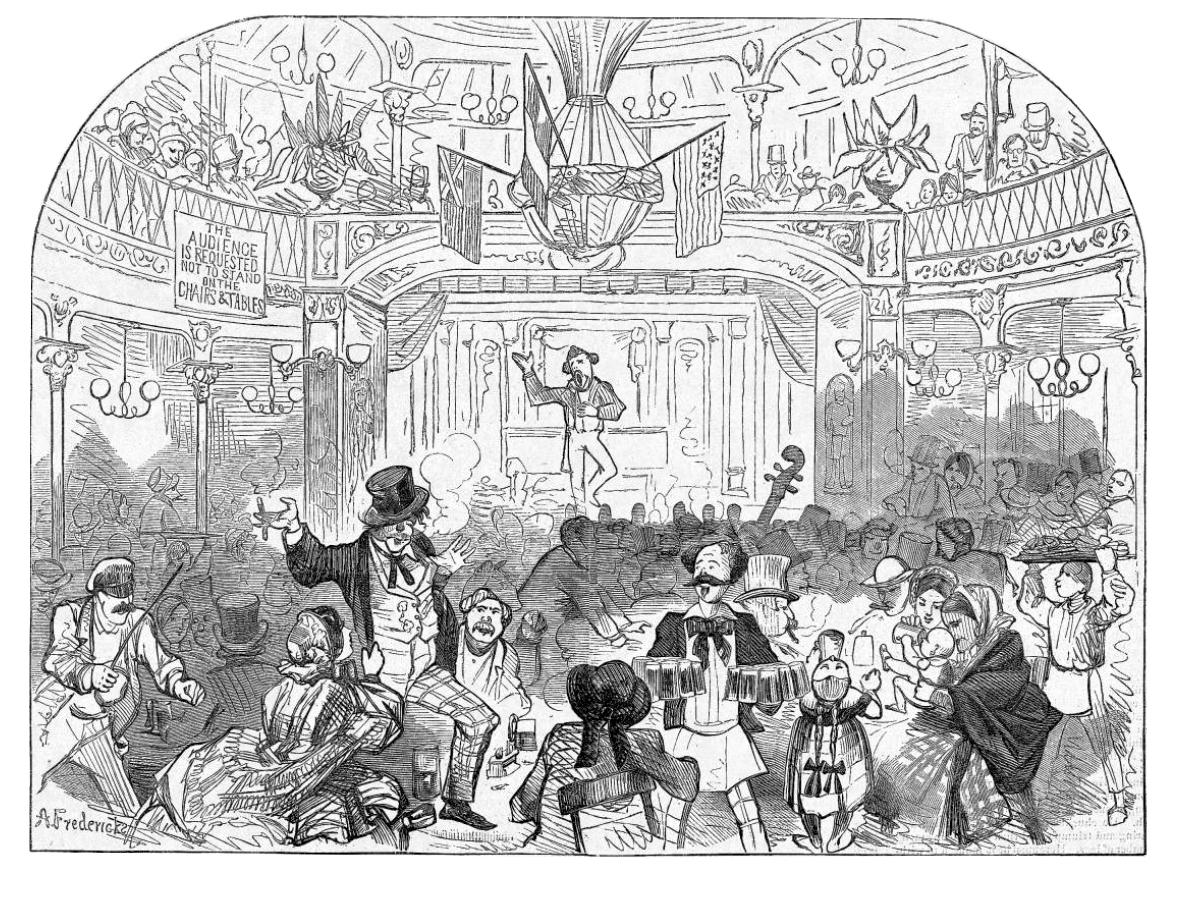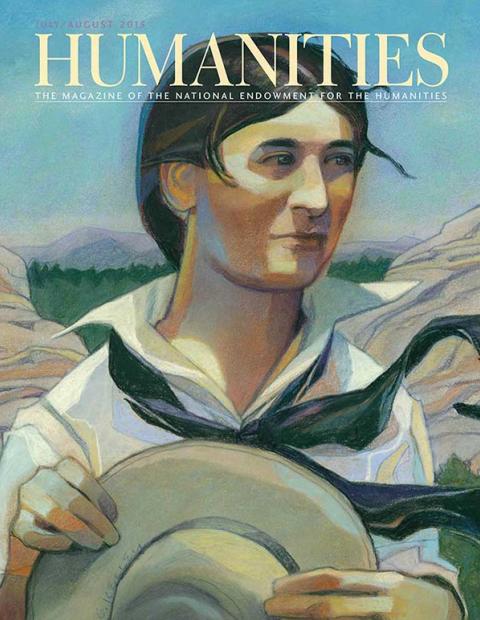Bergen County, New Jersey, is one of America’s great shopping meccas. Just across the Hudson River from New York City, its Paramus Park Mall, Garden State Plaza, and many box stores and outlet malls attract hundreds of thousands of customers each day. But not on Sunday. On that day, stores shut their doors, traffic softens, and parking lots empty. It’s been this way since the 1950s, when North Jersey suburbanites turned to Sunday laws—what many call blue laws—to keep postwar America’s consumer craze in check. Of late, a local group calling itself Modernize Bergen County has made headlines by demanding their repeal. Sunday laws, members protest, are archaic and inconvenient. They inhibit free trade and threaten religious freedom, especially for the county’s substantial Jewish and Muslim population who don’t celebrate the Sunday Sabbath. “Having these laws in today’s day and age,” one member declared, “negates the liberties and principles this country was built on.”
Blue laws were not invented in the Garden State. Part of the Puritan baggage brought from England in the seventeenth century, they remained on the books after the American Revolution despite local and national efforts to separate church and state. In the decades before the Civil War, however, they became a source of major discord that ended up fundamentally shaping the theory and practice of American democracy. Struggles over Sunday laws not only tested America’s commitment to religious liberty. They contributed mightily to the emergence of an American political tradition—minority-rights politics—which forces Americans to consider whether the majority should always rule.
The battle began with the Second Great Awakening in the early nineteenth century. Protestant reformers led by Lyman Beecher and other evangelical ministers trembled as their traditional Christian Sabbath seemed to be under assault. Instead of a day of worship, rest, and quiet contemplation, Sunday was becoming a day of raucous amusement and gratuitous commerce. Particularly threatening was the rising tide of immigrants—many of them Catholics—who brought festive Sabbath traditions soaked in alcohol from Europe. From Vermont to Alabama to Indiana, hundreds of local associations were founded to protect the Sabbath. In 1843, prominent clerics established the American and Foreign Sabbath Union to bring national unity to the burgeoning movement. Activists spread the reform message at numerous meetings and used steam-powered printing presses to bombard the nation with pro-Sabbath literature. As former president John Quincy Adams announced at the National Lord’s Day Convention in 1844, all this was to ensure that Americans obeyed God’s Fourth Commandment: “Remember the Sabbath day to keep it holy.”
Sabbath reformers hoped to win by persuading Americans to respect the Sabbath, but, increasingly, they demanded tougher Sunday laws and heightened enforcement. They appropriated the ethos of the age of Andrew Jackson and its celebration of “majority rule.” The overwhelming majority of Americans, reformers argued, were Christians who worshipped on Sundays. Therefore, state laws restricting work and play on Sundays and protecting the ability of most citizens to worship peaceably were appropriate. Supportive elected officials often mimicked their rhetoric. Sunday laws, Pennsylvania legislators declared, were especially proper in America’s political system, which “recognizes the will of the majority as its fundamental law.” “We are a Christian people, and not a Mohammedan, a Pagan, or an Atheistic people.” The Christian majority, they declared, should be protected “in the exercise of their religious rights.” Minorities needed to defer to the majority’s wishes and obey the Sunday laws. This was precisely how American democracy should work.
Reformers’ efforts combined with a powerful burst of political nativism to facilitate a surge of Sunday surveillance in the 1840s. Not all Americans greeted these developments with enthusiasm. Numerous shopkeepers and tavern-owners blatantly stayed open. Others more clandestinely kept back doors ajar, inviting knowing customers to enter and find their own style of Sunday salvation. Still others mounted more formal challenges that targeted public opinion. A diverse coalition emerged. Catholics, freethinkers, radical abolitionists, labor advocates, and immigrants attempted to strangle reform efforts in print. Sunday laws, they charged, violated America’s commitment to the separation of church and state and frustrated the promise of religious pluralism that they saw at the core of the American nation.
Jews and Seventh Day Baptists began dissenting even earlier. They claimed that Sunday laws violated the protections of religious liberty enshrined in state and national constitutions. They also objected that Sunday laws, by requiring seventh-day observers to stop working a second day in the week, amounted to a “tax upon conscience.” The “opinion of the majority,” one critic lamented, was robbing the minority “of the privilege of transacting business on fifty-two days of the year.” Jews and Seventh Day Baptists especially protested the majoritarian rationale behind the Sunday laws. According to Jewish leader Isaac Leeser, the “worst feature in all this” was “that the whole agitation is presupposed to rest on the will of the majority.” Even if majorities did support Sunday laws, Leeser wrote, it was of no consequence. There were some issues in which the majority could not rule; religion was one of them. For freedom to survive in American democracy, minorities needed to defend their rights by taking a stand against the majority’s Sunday laws.
Beginning in the 1840s, anti-Sunday law activists were among a wider group of Americans who pioneered a grass-roots political style that challenged absolute majority rule and focused on the protection of their rights as religious and moral minorities. Implementing a democratic politics of dissent predicated upon the uninhibited expression of ideas, they used their presses to publicize the mounting threat and to persuade all Americans that “the religious rights of every minor sect in the country” were at risk. They highlighted the local tribulations of seventh-day observers and printed scores of articles and petitions addressed to local and state authorities asking for the repeal of Sunday laws. In 1846, the Seventh Day Baptist General Conference capped the public opinion campaign with an influential pamphlet—Religious Liberty Endangered by Legislative Enactments—and circulated it widely. This was all foundational activism in the era’s emerging popular minority-rights politics.
Their final tactic was a turn to the judicial system. As authorities prosecuted them for Sabbath-breaking, Jews and Seventh Day Baptists pooled funds, hired attorneys, and tested the constitutionality of Sunday laws. Two so-called Jew Cases grew out of arrests of Jewish residents of Charleston, South Carolina, and Cincinnati, Ohio, for keeping open shops on Sunday. The most consequential case developed in south-central Pennsylvania, where local authorities prosecuted a group of German Seventh Day Baptists for working their communal farm on the Lord’s Day. They would take their case, Specht v. Commonwealth, all the way to the Pennsylvania Supreme Court.
To represent them, Seventh Day Baptists turned to Thaddeus Stevens, the future radical Republican congressman. In the mid 1840s, Stevens was practicing law in nearby Gettysburg and had already established a track record of embracing controversial causes. He staunchly advocated free public education, criticized capital punishment, defended fugitive slaves, supported suffrage rights for black men, and opposed slavery’s westward expansion. His defense of the Seventh Day Baptists provided another site in which Stevens cemented lifelong commitments to social equality, civil rights, and the defense of oppressed minorities.
When Specht v. Commonwealth came to court in 1848, Stevens’s argument provided a capstone to the many arguments previously made against Sunday laws. Most centrally, Stevens maintained that Pennsylvania’s Sunday law violated the state constitution’s protection of religious freedom and “the rights of conscience.” Despite arguments to the contrary, Stevens insisted that the Sunday law was more than a secular civil regulation. It treated Sunday as a “holy, and a sacred day” and prohibited labor, not to give “rest to man,” but because labor “profanes the Lord’s day.” For those like his clients who believed that Sunday was “not a holy day,” to prevent them from working was akin to ordering them to “kneel before the altar, or the images of the Saints.” Unless it invalidated the Sunday law, the court would set a dangerous precedent that would facilitate “a perfect union of church and state.”
Stevens concluded with a full endorsement of the “independent Judiciary” and its most important role in America’s constitutional democracy: to “protect minorities against the will of majorities.” The court needed to “stand by the constitution, and interpose their protecting shield between the many and the few.” Not to put too fine a point on it, Stevens reminded the court, “It was the same influence—the voice of the PEOPLE, crying ‘crucify him! Crucify him!’ that bore down the judgment of Pilate, and made him the judicial murderer of HIM, who suffered for conscience’s sake.” Unlike Pilate, the court needed to ignore the “majorities forgetful of the true principles of our government” and defend the “civil and religious liberty” of minorities.
The Pennsylvania Supreme Court disagreed and unanimously upheld the constitutionality of the Sunday law. Notably, the court offered two very different opinions to justify Sunday laws. Judge Thomas S. Bell maintained that the Sunday law was merely “a civil regulation,” mandating a day of rest and not a religious regulation that might interfere with religious freedom. From the other end of the bench Judge Richard Coulter differently declared that the Sunday law functioned quite properly to “guard the Christian Sabbath from profanation.” Repeating the arguments of reformers, Coulter observed, “We are a Christian people and State; we are part and parcel of a great Christian nation. All over . . . this great nation, the Christian Sabbath is recognised, and guarded by the law as a day of sacred rest.” The Sunday law should stand on its proper religious foundations.
Losing in court, however, did not mark the end of the anti-Sunday law movement and its struggle to protect minority rights. As reformers reorganized in the late 1850s to combat rising Sabbath infractions, the foes of reform again sprang to action, giving rise to a conflict that contemporaries called “The Sunday Question.” It was such a major question that one observer noted in 1859—on the eve of the Civil War—that “in New-York, Philadelphia, Baltimore, Chicago, St. Louis and elsewhere, the inevitable Slavery question yields place to Sunday matters.” New York City became a national focal point. There the well-financed New York Sabbath Committee (NYSC) initiated the action. This group counted prominent members of the “bench, bar and pulpit, and the commercial classes” among its members. President Norman White, for example, was a New England-born Presbyterian who had prospered in paper manufacturing among other business enterprises. Recording Secretary James W. Beekman had gained his substantial real estate fortune the old-fashioned way—he inherited it. No doubt these elites saw in the Sabbath crusade not only a way to honor their maker but also a way to protect the value of their fortunes from the threat of urban disorder. They lobbied the Metropolitan Police to do what they were supposed to do: enforce the Sunday laws.
The NYSC elicited the ire of many New Yorkers but perhaps no one more than J. L. Hatch. A Congregationalist clergyman, Hatch had fallen out of favor with more than one congregation for his liberal beliefs. Among other purported sins, he preached the desirability of “Christians engaging in dancing and other amusements” and suggested that the Sabbath was “intended as a day of recreation.” Hatch was eventually expelled from the pastorate, but he found a new calling as New York’s leading challenger of Sunday laws. In 1858, he founded a landmark rights organization—the American Society for Promoting Civil and Religious Liberty (ASPCRL)—to protect, as he explained, “civil and religious liberty” from so-called reformers who sought “to secure the adoption and enforcement by government of their peculiar views respecting Sunday observance.” The ASPCRL aimed to grow its membership and to influence public opinion and policy makers. Hatch organized meetings and lectures, published letters in newspapers, and circulated a free pamphlet that argued that the Sabbath was “a festival appointed for recreation and enjoyment.” He also challenged reformers to debate the issue of Sunday laws (they declined) and lobbied the commissioners of Central Park to schedule musical performances on Sundays.
In just over a year, Hatch amassed over one thousand followers. In 1859, the ASPCRL petitioned authorities not to enforce the “unconstitutional” Sunday laws. The document was signed by seven hundred fifty Germans and Jews and five hundred fifty native-born Americans, including prominent Seventh Day Baptist leaders. The polyglot ASPCRL was soon joined by a second grassroots association—the German Association for Resisting All Arbitrary Sunday and Prohibitory Laws (GARASPL). This association’s emergence reflected the fact that Germans had become a chief target of Sabbath enforcers and highlighted the essential role the growing German community played in the anti-Sunday law movement.
The ASPCRL and GARASPL’s joint campaign began with a mass meeting in September 1859 that invited citizens opposed to Sunday laws to Volks Garden in the Bowery. Germans dominated the crowd, but Jews and Seventh Day Baptists as well as members of the French and Italian communities also made a showing. Combining “pleasure with business,” attendees heard music, drank beer, and smoked meerschaums and cigars. They also chose officers and listened to speeches (in both English and German) that condemned Sabbath reformers and Sunday laws, defended religious freedom, and called for limits to majority rule. Attendees committed themselves to continued activism and legal resistance.
A new legal development in the spring of 1860 changed the landscape of the anti-Sunday law crusade. The Republican-dominated state legislature passed a new law banning theatrical performances on Sundays. Reformers had long targeted Sunday performances as a particularly bothersome vice, and they fumed that theater owners skirted the Sunday laws by billing their events as “sacred concerts.” The new measure meant to close the loophole and stipulated a substantial $500 fine. It spawned new associations among German theatrical managers, spurred new attempts to evade the law, and brought a spate of arrests that led to several highly publicized legal cases in New York and Brooklyn.
At the center of the controversy was Gustav Lindenmuller. A former German revolutionary and an avid Republican, Lindenmuller owned the Odeon Theater in the Bowery. In the aftermath of the new law, Lindenmuller led fellow theater managers in planning resistance, which included taxing the sale of beer to form a legal defense fund. He also instituted a new tactic at the Odeon. He hung a sign near the entrance that identified his theater as the meeting house for the “German Shaker Association,” whose members worshipped with dramatic performances and beer. To Lindenmuller, this was not that unlike the Catholics who legally worshipped “with organ, incense, full bands of music, and every ceremony of pomp and splendor which mortal imagination can conceive.” Why couldn’t the German Shakers form their own religion just as “the Seventh Day Baptists, the Jews, and the Shakers” had? Despite the self-proclaimed religious nature of his theater, Lindenmuller was arrested and served with an injunction to cease all Sunday performances. His “test case” would be the New York anti-Sunday law movement’s most important. Newspapers across America followed these battles closely, and, as before, minority rights became the theater of American democracy.
Lindenmuller appealed his conviction to the Supreme Court of New York and challenged the constitutionality of the Sunday Theater Law. His prominent attorney, James T. Brady, maintained that the law violated the New York state constitution’s guarantees of “the free exercise and enjoyment of religious profession and worship.” The court disagreed. The judges dismissed the suggestion that Lindenmuller’s Shaker Association was a legitimate religion. Echoing the long-standing defense of Sunday laws, the court found that because the law mandated no compulsory “religious observance,” it did not infringe upon Lindenmuller’s religious freedom. The legislature had properly “restrained the people from secular pursuits and from practices . . . deemed hurtful to the morals and good order of society.” It was similar, the court found, to laws banning gambling, lotteries, profanity, and polygamy, which rightly limited citizens’ “natural rights” for society’s benefit. The construction of religious freedom Lindenmuller proposed, the court feared, would authorize a man to “go naked through the streets [and] establish houses of prostitution ad libitum.” Protecting Sunday laws from the anti-Sunday law crusade would keep Americans clothed and prevent American society from becoming a licentious den of sin.
New York’s opponents of Sunday laws might have taken their case to the Court of Appeals, but the demands of the Civil War, which called militiaman Lindenmuller to service, interfered. Lindenmuller v. The People would long remain the leading statement of the constitutionality of New York’s Sunday laws. As a supportive newspaper announced, this decision should be “highly satisfactory to all Christians and all right-minded citizens.” The theater opened “for German Jews and infidels” was rightly closed on Sundays in deference to the majority’s wishes.
Battles over Sunday laws did not end with the Civil War. The events of the previous two decades set a pattern that would continue into the twenty-first century. Certainly, a modern legacy of the old blue laws is the limits on Sunday business that persist in Bergen County and other parts of the United States. But the broader legacy concerns a central dynamic in the history of American democracy: the tension between majority rule and minority rights. As with the struggles over Sunday laws, that tension has so often been driven by competing grassroots movements, some preaching majority rule and moral order and others championing civil rights and civil liberties. That core conflict continues to animate American public life, and for many, it operates seven days a week.






